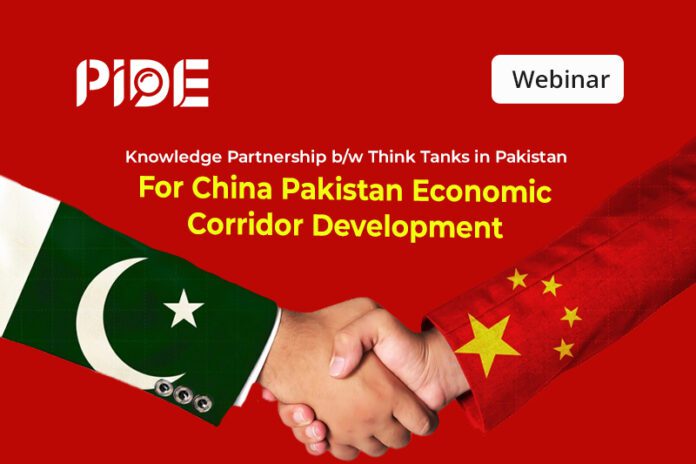The Pakistan Institute of Development Economics (PIDE) organized a webinar on “Knowledge Partnership B/W Think Tanks in Pakistan for China Pakistan Economic Corridor Development” on 26th January, 2023 (Thursday) between 11:00am-12:00pm, through the zoom platform.
The discussion was moderated by Nadeem Ul Haque, Vice Chancellor, PIDE, Islamabad
The guest speakers included:
- Tahir Mumtaz, Dir. China Study Centre, COMSATS University, Islamabad
- Miss Xiang Yang, Dir. China Study Centre, NUST, Islamabad
- Shakeel Jajja, China-Pakistan Management Initiative, LUMS, Lahore
- Nasir Afghan, Dir. China Study Centre IBA, Karachi
- Zahid Anwar, Pro VC/Dir. China Study Centre, University of Peshawar
- Abdul Sattar, Dir. China Study Centre, BUITEMS, Quetta
- Muhammad Tufail, PATRON China-Pakistan Economic Corridor CELL, NED, Karachi
- Attaullah Shah, VC/CFR on CPEC Karakoram Int. University, Gilgit
- Talat Shabir, Dir. China Study Centre, Institute of Strategic Studies, Islamabad
- Ms. Farhat Asif, President Peace & Diplomatic Studies, Center for BRI & China Studies, IPDS, Islamabad
- Mustafa Hyder Sayed, CEO, Pak-China Institute, Islamabad
Key Takeaway Points:
- Advocacy on CPEC-Research and Implementation: Competitors are succeeding in creating the perception that CPEC has stalled since there is less visibility and projection in the public domain. The role of think tanks should be to do evidence-based quality research, pick economic trends, and what specific investment we can solicit from Pakistan.
- Lack of disconnect between academia and policymakers: The receiving approach needs to go away with a more effective operating model by engaging with counterparts. As scholars, there needs to be more clarity on the future trajectories and developments of CPEC.
- Knowledge Partnership and Lessons Learned: Translate international best practices from China by engaging with academia, media, think tanks, and youth from both countries. There should be a collective value proposition involving all stakeholders and centers regarding CPEC. The focus should be on novelty while connecting with Chinese universities and making it techno-centric rather than IR-related.
- Revolution not Repetition: While coordinating with China, we need to change our outlook by having an interdimensional thinking pattern and not confine our research to CPEC. We need to engage more closely and personally across other platforms to use the wealth of knowledge effectively by encouraging Chinese universities to set up their campuses in Pakistan and vice versa, hold cultural exchange programs and bring their resources and expertise here.
- CPEC to be treated as a monolithic project: CPEC has a galaxy of projects regarding power, infrastructure, etc. Each project is independent with its own timeline
- Create an investment-friendly atmosphere to attract foreign investment: Established universities in China cater to the demand for vocational training of CPEC, what Pakistan lacks. Need to identify problems project and sector-wise and then connect with other think tanks. For instance, if we don’t research agricultural productivity or approve agricultural products in Pakistan (AQSIQ), how can we expect exports to go through CPEC to China? Hence, we need to assess and analyze where we stand with our investments to attract Chinese industries.
- MOU process to be streamlined effectively: China has offered fellowship opportunities to faculty members and students from Pakistan and wants to train and employ Pakistani students, establish a technology center, and conduct joint research on mutual interest. However, the Government of Pakistan has a very vigorous of approving the MOU, hence it needs to be more flexible for future collaboration between the two countries. So far, NED is the only university where Chinese is mandatory for all students in Pakistan.
- Encourage people to people relation: The focus should not be to seek the government’s permission and have a more personalized interaction through these forums, otherwise CPEC will end up being an elite trap.
- Groundwork Knowledge: Pakistan lacks local market knowledge while dealing with China.
It is important to be updated with the current theme, market trends, linkages with relevant stakeholders, before conducting business.




